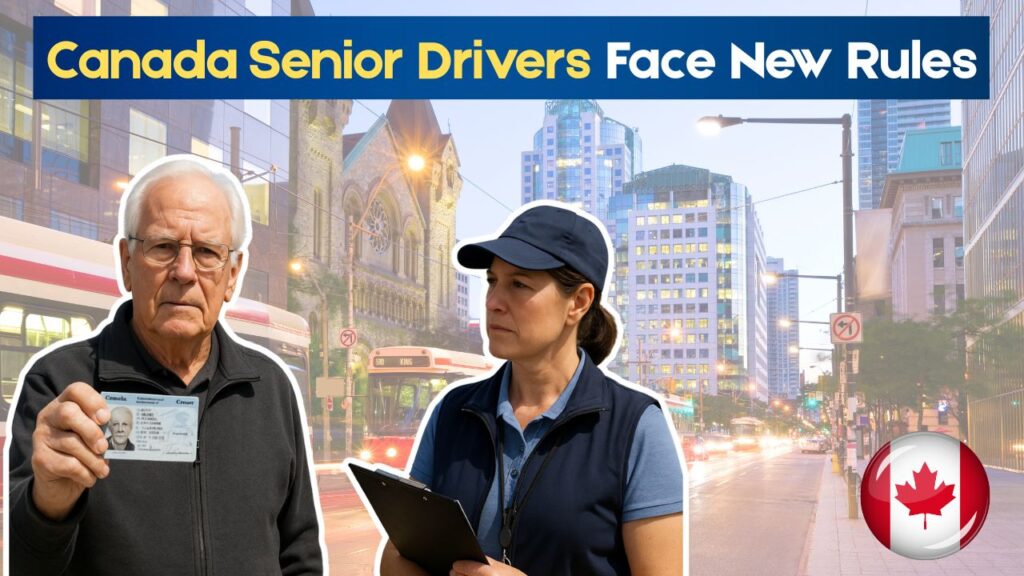Starting October 2025, Canada’s senior drivers will face new licensing rules aimed at improving road safety and ensuring that older motorists can continue driving confidently. These updated license regulations focus on medical fitness, vision assessments, and testing frequency for Canadians aged 70 and above. The new driving laws emphasize both safety and accessibility, providing options for renewal extensions and modified testing. This change has sparked discussions among senior citizens, families, and driving authorities about balancing road safety standards with seniors’ independence behind the wheel.

New Canadian Driving License Rules for Seniors
The Canadian transportation authorities have introduced a refreshed set of requirements for senior drivers starting in October 2025. Drivers over 70 will now need to provide regular medical reports and take more frequent vision tests. The driving license renewal process will also become more digitized, allowing applicants to complete initial documentation online. Some provinces like Ontario and British Columbia are offering optional classroom-based refreshers, helping senior drivers stay updated with traffic law changes and safe-driving practices. The ultimate goal is to improve confidence and safety for everyone on the road.
Medical and Vision Assessments for Senior Drivers
One of the most notable updates in the October 2025 regulations is the enhanced focus on medical evaluation forms and vision assessments. Senior drivers will need to undergo eye tests every two years to maintain a valid license. If a medical practitioner identifies potential concerns about reaction time or mobility, the license renewal period may be shortened for closer monitoring. Canadian provinces are also exploring flexible rules for seniors in rural areas, ensuring they can access testing centres conveniently. This shift ensures that driver health checks are consistent and reliable nationwide.
Online Renewals and Testing Updates Across Provinces
To make the renewal process smoother, several provinces have launched online license renewal systems for seniors. These platforms let users upload documents, book medical test appointments, and even take knowledge tests digitally. While physical driving assessments remain mandatory for higher-risk cases, most seniors will only need to appear in person once every five years. The Canadian Ministry of Transport is also standardizing these requirements to avoid provincial inconsistencies. With this upgrade, more than 1.2 million senior drivers are expected to benefit from faster, paperless renewals starting October 2025.
| Province | Minimum Age for Testing | Vision Test Frequency | Medical Report Requirement | License Validity Period |
|---|---|---|---|---|
| Ontario | 80 years | Every 2 years | Yes, every renewal | 2 years |
| British Columbia | 75 years | Every 3 years | Yes | 5 years |
| Alberta | 75 years | Every 2 years | Yes, if advised | 3 years |
| Manitoba | 80 years | Every 2 years | Yes | 2 years |
| Quebec | 75 years | Every 4 years | Optional | 4 years |

Impact of the 2025 Changes on Canadian Senior Drivers
The new license regulations will help improve both safety and accessibility for aging motorists. While some seniors may find the extra medical and vision requirements challenging, others appreciate the renewed focus on safety. The introduction of digital renewal systems and province-specific support services aims to make the process simpler and faster. These changes also align with Canada’s broader effort to modernize road safety policies for a growing senior population. Ultimately, the 2025 update ensures that every senior driver remains safe, independent, and confident behind the wheel.
FAQ 1: When do the new rules start?
The new driving license rules for seniors begin in October 2025 across Canada.
FAQ 2: Do all provinces have the same age requirement?
No, age and testing frequency vary by province, ranging from 70 to 80 years old.
FAQ 3: Can medical reports be submitted online?
Yes, most provinces now accept online submission through official portals.
FAQ 4: Will the changes affect existing licenses?
Existing licenses remain valid until renewal, after which new rules apply.





